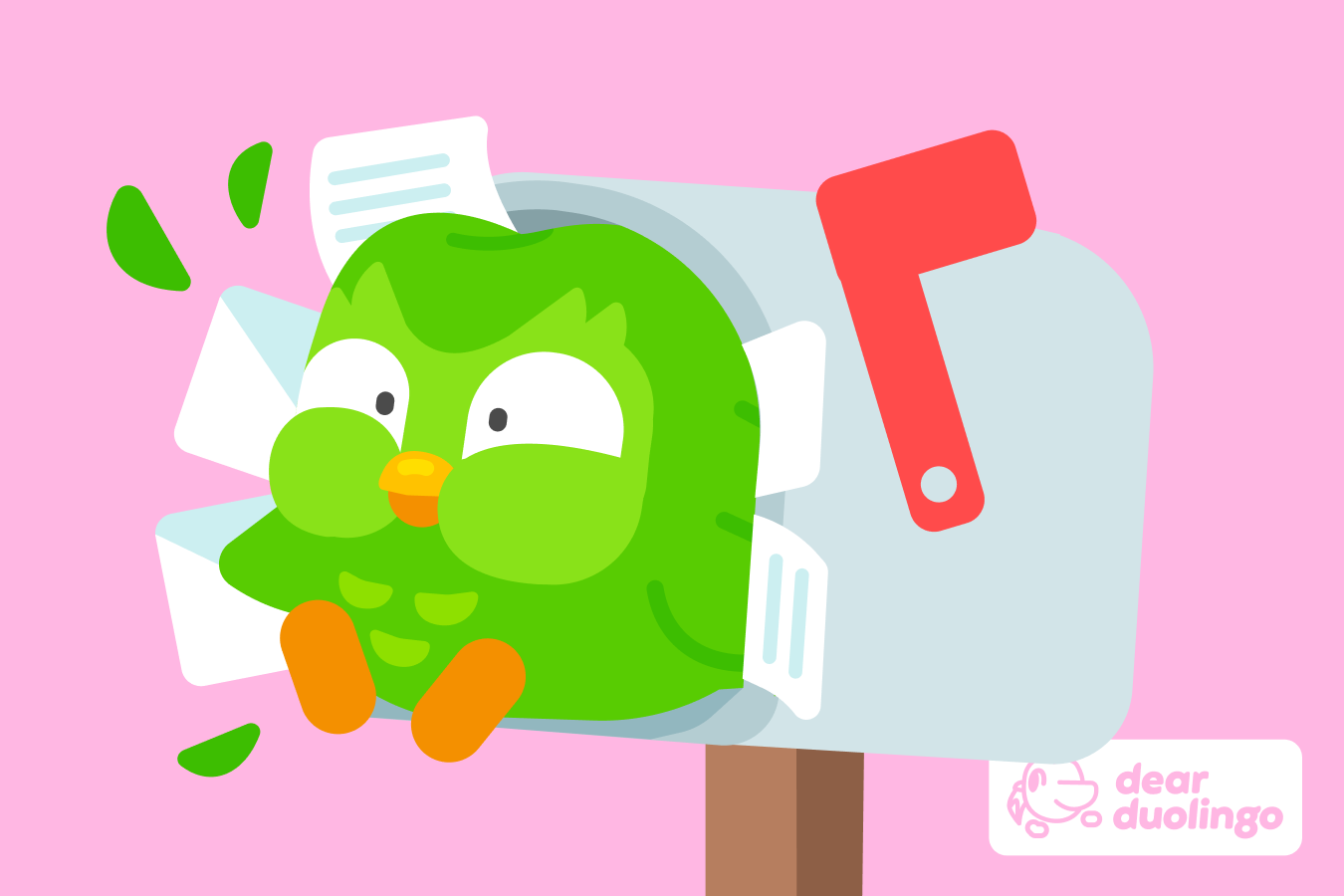Welcome to another week of Dear Duolingo, an advice column just for language learners. Catch up on past installments here.
Hi blog readers, I’m Dr. Elise Hopman, a learning scientist at Duolingo. I’m originally from the Netherlands, and I have graduate degrees in Cognitive Neuroscience and Psychology, with a focus on second language learning. Ironically, it was hard to keep up with studying languages myself while being in grad school to learn about how our brain learns languages! I was often tired by the end of the day, or even by lunch, so this week’s Dear Duolingo question really speaks to both my professional expertise and personal experience.
Our question this week:

Thank you so much for asking this question! I do remember this episode of Dexter’s laboratory—when I was a kid, I saw it on TV in English, with Dutch subtitles. Imagine how my brain felt with French as a third language while watching that episode—I definitely needed a nap after that!
Your question about learning while you sleep reminds me of another Dear Duolingo post, where Dr. Ben Reuveni discussed multiple types of memory—in particular, working memory (also called short-term memory) and long-term memory. Here's how sleep interacts with short-term and long-term memory!
Can you learn a language while sleeping?
Yes… sort of! You are spot on with the observation that language learning is all about building and strengthening connections in your brain. While you sleep, those connections strengthen.
This is especially helpful for new things you learned that day, like new words in a second language. So even though you are not learning those new words in your sleep, sleep is essential for remembering those new words long term. Let’s unpack how that works!
How does sleep strengthen our memories?
When we sleep, our brains *consolidate* memories. Consolidation is the process of moving memories from short-term memory into long-term memory, and sleep is really important for allowing this consolidation process to happen.
It starts while you're awake and learning something. When you learn—whether by doing a Duolingo lesson, practicing a new skateboarding trick, or learning your new classmate’s name—your brain creates a "trace": a connection between what you learned and other experiences and knowledge you have. Sleep allows those memory traces to get "copied" from short-term memory (where you held them during your learning experience) into long-term memory so you can use that information later!
Language learning while you sleep
Researchers can study how and what we learn while sleeping by doing sleep experiments. In these studies, participants do something like learn 30 French words, sleep, and then take a test on those same 30 words. There are many different versions of these studies: Sometimes participants sleep only an hour or 2 before the test, other studies wait for a full night's sleep before testing, and others do something in between. Then researchers compare the test results of the participants who slept to control groups who had to stay awake during the same time. (I know which group I'd rather be in!)
Here are two of my favorite findings about sleep and language learning:
Sleeps helps with new sounds and accents
Research shows that our brain processes sound patterns while we sleep. Often, learners have to practice brand-new sounds in their new language, and it can be really challenging to hear differences, much less pronounce them! For example, the English "r" and "l" sounds can be hard for speakers of some languages, and English speakers typically struggle with the different "d" sounds in Urdu and Hindi.
The good news is that consolidation while you sleep can help your brain pick up on patterns in the sounds of the language you’re learning! And this even works in languages you know well: If you’re hearing a speaker with an unfamiliar accent for the first time, after sleep you’ll be better able to understand other speakers with that same accent.
Sleep helps you remember new words
Sleep consolidation is especially helpful for learning new words! While you sleep, the connections between the new word you’re trying to learn and other, related words get strengthened. These strong connections help you recognize the word faster and even help you when you have to come up with the word yourself, like when writing or speaking
That means that if you want to really learn a word well, it’s much more helpful to practice the new word a couple of times a day, spread over several days, than to repeat it 20 times in a row in one cramming session. And Duolingo courses are designed with this in mind: By following the path, newly learned words come back spaced out over time.
Can we build a machine that teaches you while you sleep?
Alas, no. In the 1950s, people actually sold tape recorders with the claim that if you listened to a tape on repeat overnight, you would learn what it played. Research in the 1970s has debunked that claim, though it makes for a fun Dexter’s Laboratory episode!
But, there’s a plot twist! While learning a new language, or even new words, while you sleep is not possible, some other types of learning can happen while you sleep—like learning to associate rotten egg smell with cigarettes to help people quit smoking.
Unfortunately for you and me, the processes involved in language learning are not as easy to hack. However, Duolingo can help you get the most of your learning (and sleeping) time!
Why sleeping is important for learning
Now, many people don’t get enough sleep, and as a fan of naps, I want to talk a bit more about how important sleep is for learning—even beyond the memory consolidation we talked about earlier!
Before your brain can consolidate any memories, you need to learn the new thing in the first place. And your brain has a harder time doing that if you haven’t slept long enough: Lack of sleep makes it harder to concentrate, which makes it harder to pay attention and get that information in short-term memory.
Lack of sleep also has negative effects on your mood and your ability to make decisions and stick to habits—like doing a daily Duolingo lesson so that you can understand Korean by the time Season 2 of Squid Game rolls around 😉
For the best learning results, here are a few practice tips:
- Make sleeping well a priority, and don’t miss sleep to cram (or pack, or scroll social media).
- Space out your learning, like on the Duolingo path, and do a little at a time.
- Make language learning a habit—study daily for best results!
Learn more than you dreamed you could
While I can’t build you a machine to help you learn French while you sleep like Dexter did, you were born with a brain that uses sleep to consolidate everything you’ve learned that day. And while it can be tempting to stay up late studying, your brain works a lot better if you give it the rest it needs!
For more answers to your language and learning questions, get in touch with us by emailing dearduolingo@duolingo.com.
